RTX 4060 vs RTX 3060 12GB GPU faceoff: New versus old mainstream GPUs compared
A head to head battle between the new and old 60-class Nvidia GPUs.
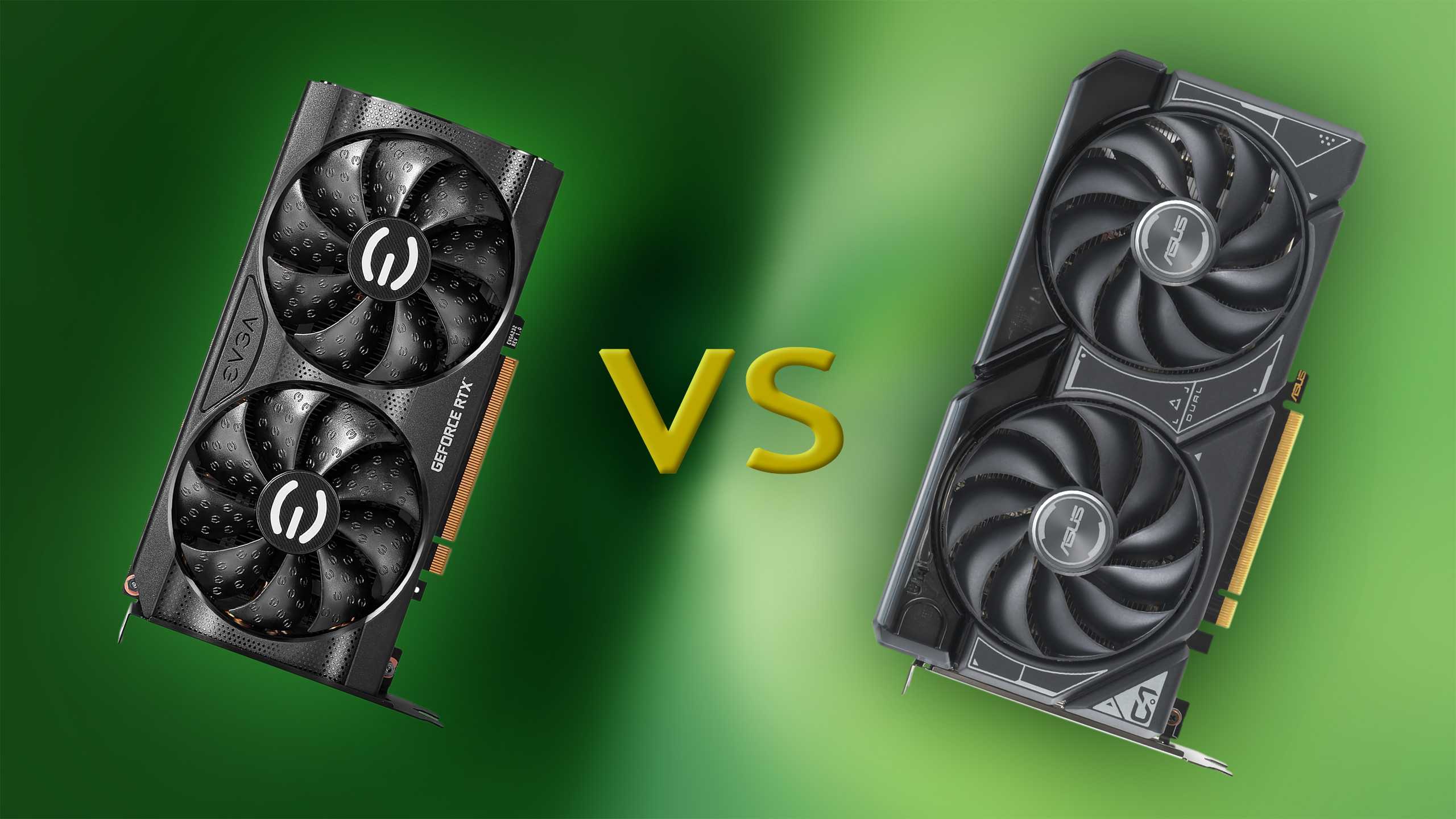
The RTX 4060 is up to 20% faster than the RTX 3060 12GB at 1080p and as much as 10% faster at 4K ultra in our testing. The newer 4060 card is superior to the RTX 3060 12GB for content creation and professional application performance, as well. The only area where the 12GB 3060 leads its replacement is with AI workloads, where VRAM is a concern.
Both of these GPUs have been on our list of the best graphics cards at one time or another. The Nvidia RTX 40-series Ada Lovelace GPUs have been a bit of a mixed bag, particularly on the lower end of the price and performance ladder. The RTX 4060 was widely criticized for cutting back on the VRAM relative to its RTX 3060 12GB predecessor, resulting in a relatively minor increase in performance — or sometimes even a performance regression. Or at least that's the common wisdom you'll see floating around online these days. But how bad is it really?
This GPU faceoff aims to answer that question, and since it's Nvidia versus Nvidia we have something of a war of the (green) roses. We've seen people suggest that the RTX 3060 12GB, today, is a better buy than the RTX 4060. Of course, finding a brand-new 3060 12GB for sale is getting to be a bit difficult, but we'll look at used card prices (for both GPUs) as well, as we draw the battle lines and pit the two cards against each other.
The RTX 4060 represents the lowest entry point (on desktops at least) for the 40-series cards. The RTX 3060 on the other hand is a step above the base model RTX 3050 8GB. Nvidia also muddied the waters later in the product cycle with the RTX 3060 8GB card (which we haven't reviewed), plus the more recent RTX 3050 6GB (also not reviewed here) that came out after the RTX 4060 launched. Needless to say, the 4060 looks quite a bit better when compared with the lower class 3060 8GB card.
But our focus is on the two primary cards, so let's dig into the details, looking at performance, price, efficiency, and other features — in rough order of importance.
RTX 4060 vs RTX 3060 12GB: Performance
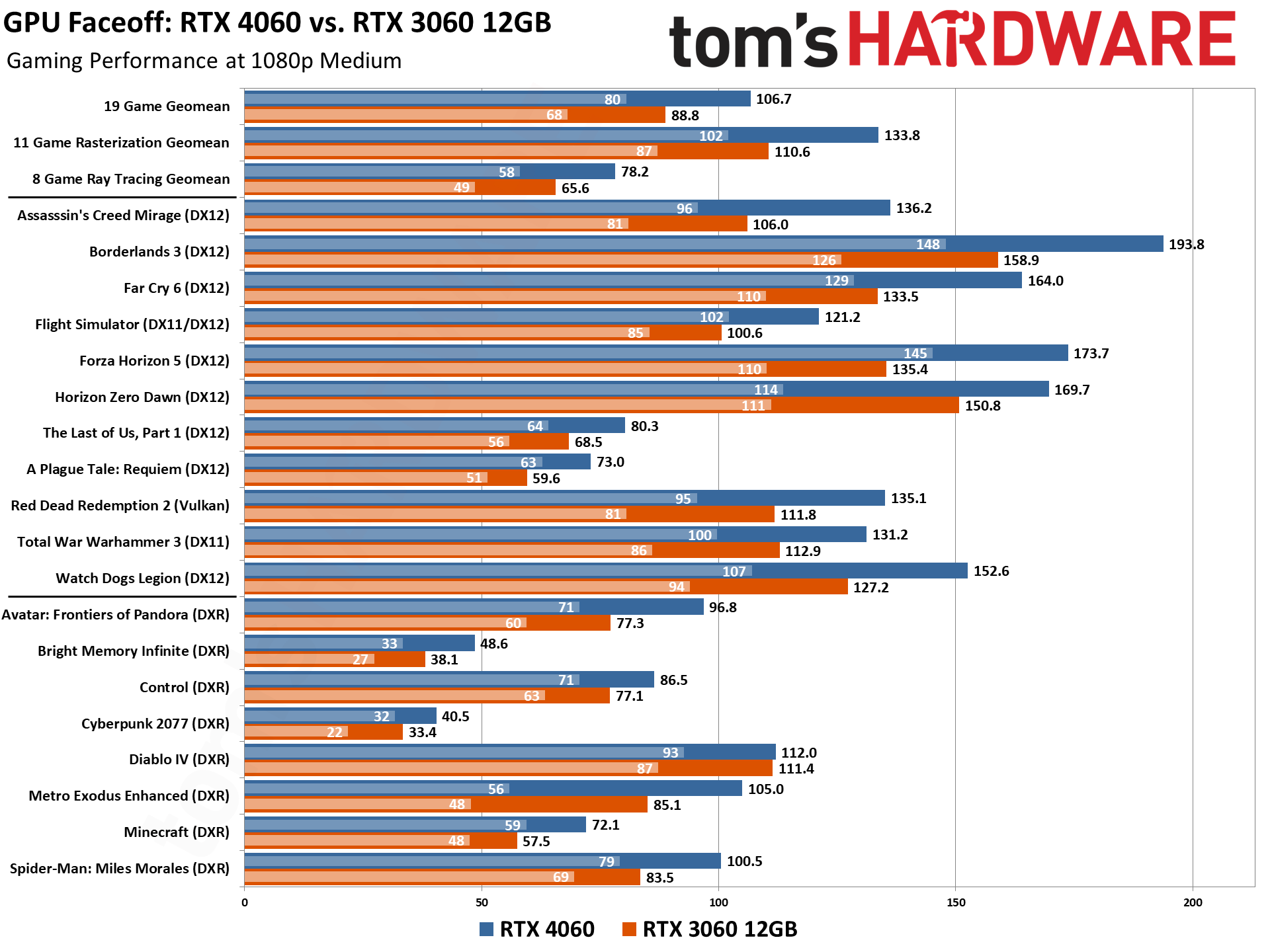
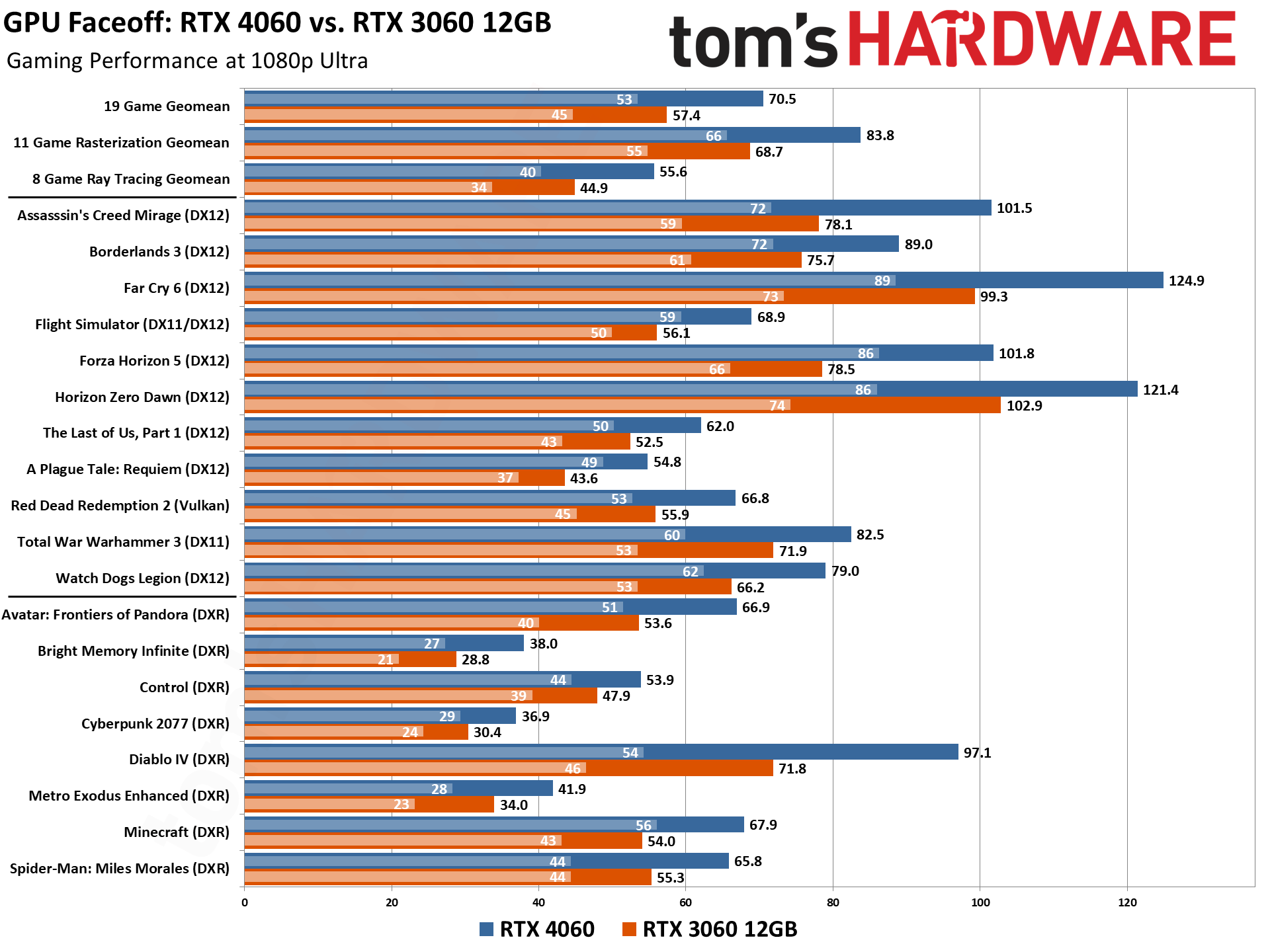
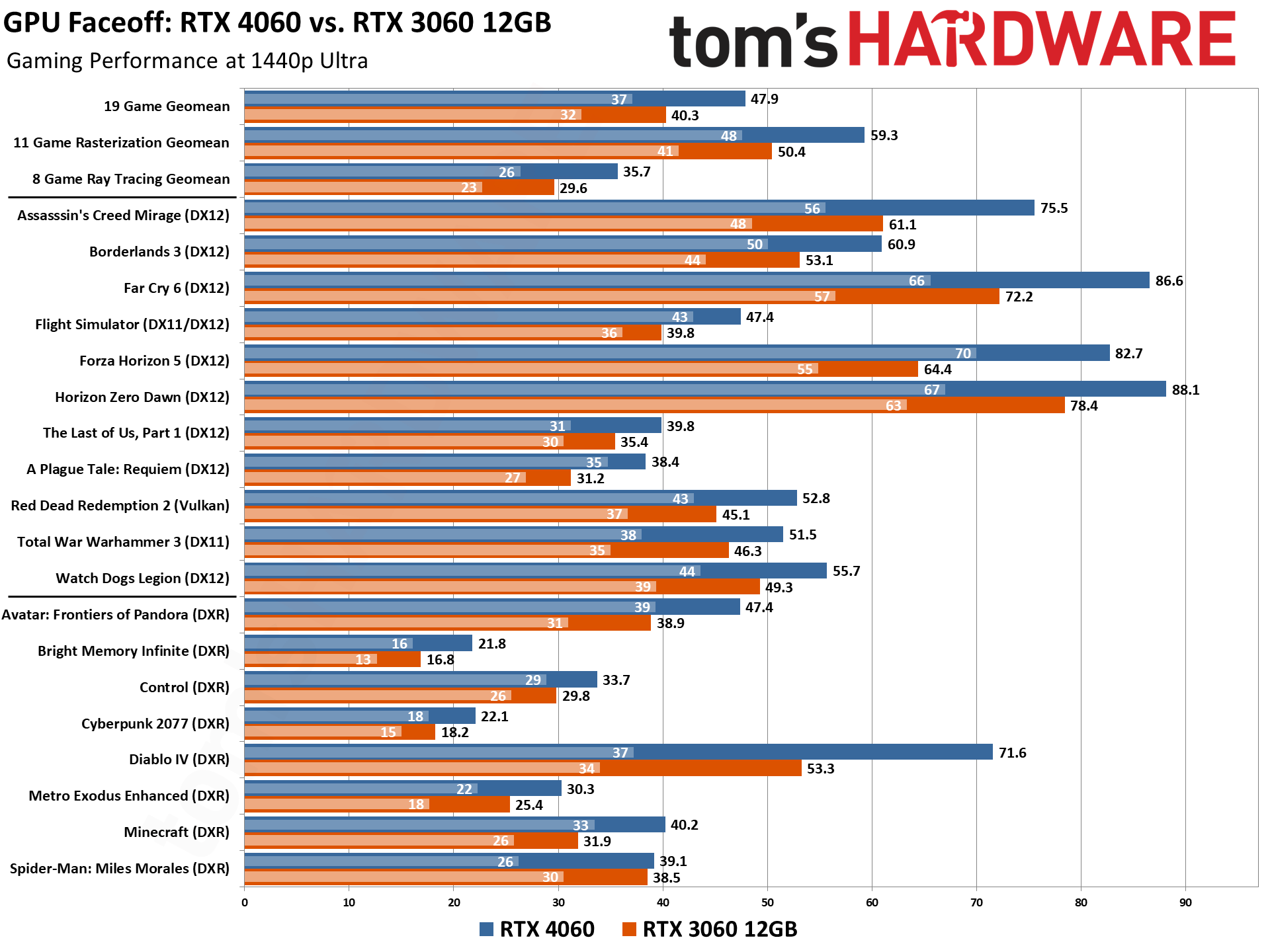
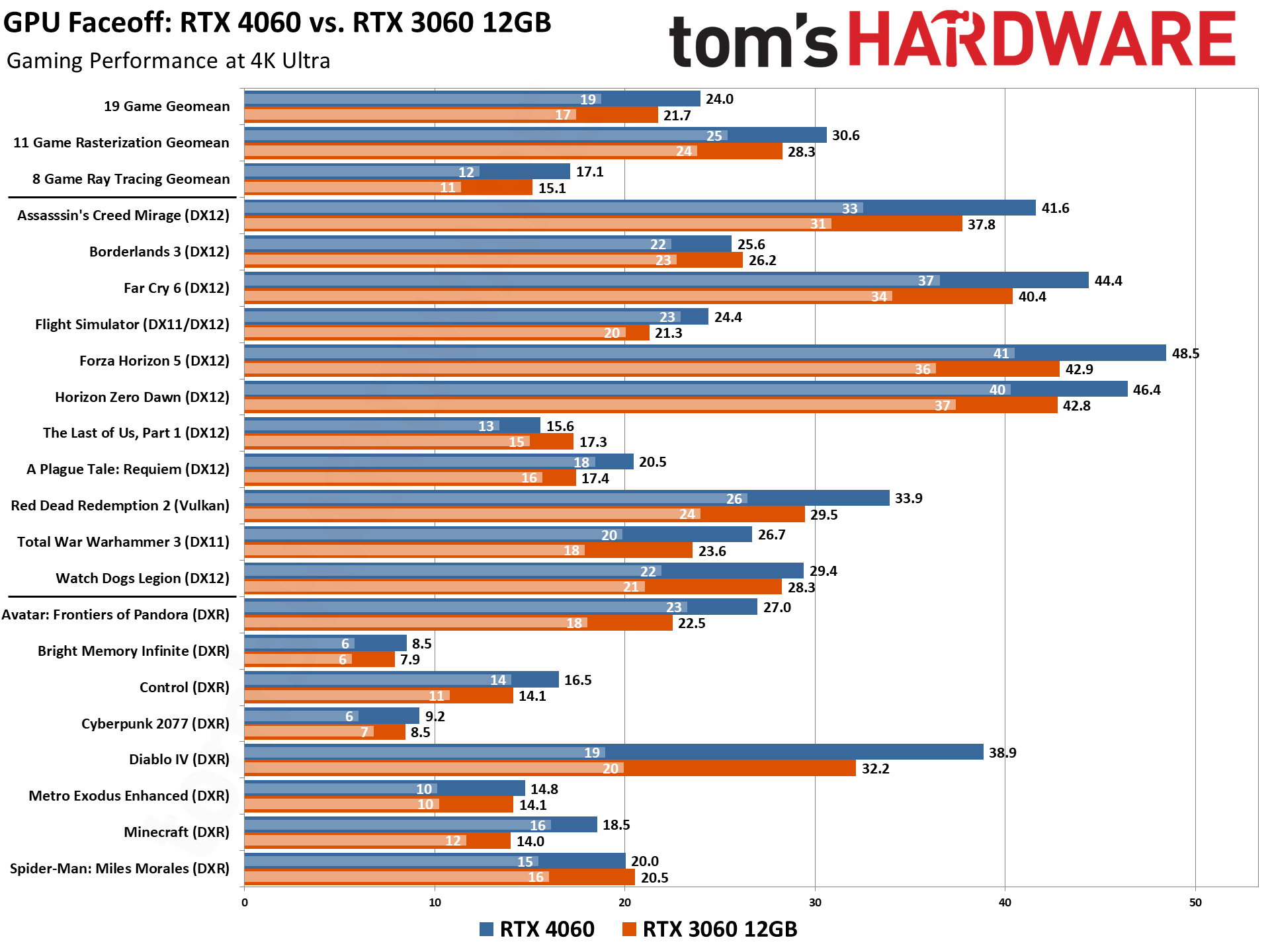
- Contrary to popular belief, the RTX 4060 isn't slower than the RTX 3060 12GB
- The RTX 4060 is up to 20% faster than the 3060 12GB at 1080p and 1440p, and up to 10% faster at 4K ultra
- Even in VRAM-limited gaming scenarios, the RTX 4060 generally performs better than the RTX 3060 12GB in our tests
- The RTX 4060 is superior to the RTX 3060 12GB for content creation and professional application performance
- The RTX 3060 12GB is a better pick than the RTX 4060 for AI workloads where VRAM is a concern
We've seen plenty of people lamenting the "weak" performance of the RTX 4060, claiming that it's often not even faster than its predecessor. This is a generally false statement. Overall, across our full test suite, the RTX 4060 is around 20% faster at 1080p and 1440p, and still over 10% faster even at 4K ultra — a setting that neither card handles well.
While there are a few edge cases where the 3060 12GB does deliver superior performance, these are at best pyrrhic victories, with neither card running at acceptable levels. In fact, of the 19 games we tested, at four different settings/resolution combinations, the only cases where the 3060 12GB came out ahead are at 4K ultra — and neither GPU was able to average 30 fps or more in those games.
Granted, there's one exception to the above, sort of. In Spider-Man: Miles Morales, at 1440p ultra with maxed out RT settings, the 4060 averaged 39.1 fps while the 3060 got 38.5 fps. That's basically tied, but more importantly, 1% lows were 30.5 fps on the 3060 compared to 26.2 fps on the 4060. Overall, the 3060 does deliver a better experience in that one particular instance. There are almost certainly other instances of games that will run better on the 3060. But examples of such are few and far between.
Our test suite is generally heavy on demanding games, with eight RT enabled games and quite a few others that can struggle on 8GB of VRAM. Diablo IV, Forza Horizon 5, The Last of Us, Spider-Man: Miles Morales, and Watch Dogs Legion all represent games that can benefit by having more than 8GB of VRAM, even at 1080p and 1440p. We know this by looking at Nvidia's RTX 4060 Ti in both 8GB and 16GB trim. But comparing the 4060 8GB and 3060 12GB, those same five games generally run better on the 4060 at 1440p and below.
This isn't to say that the RTX 4060 provides a massive uplift over the 3060 12GB, but keep in mind that it also comes in at a lower official MSRP. It ends up straddling the line a bit as a replacement for both the RTX 3050 and 3060 models. For the intended purpose, namely mainstream 1080p gaming, it does a decent job and easily outpaces AMD's alternative — check our RTX 4060 vs RX 7600 GPU faceoff to see how that matchup went down.
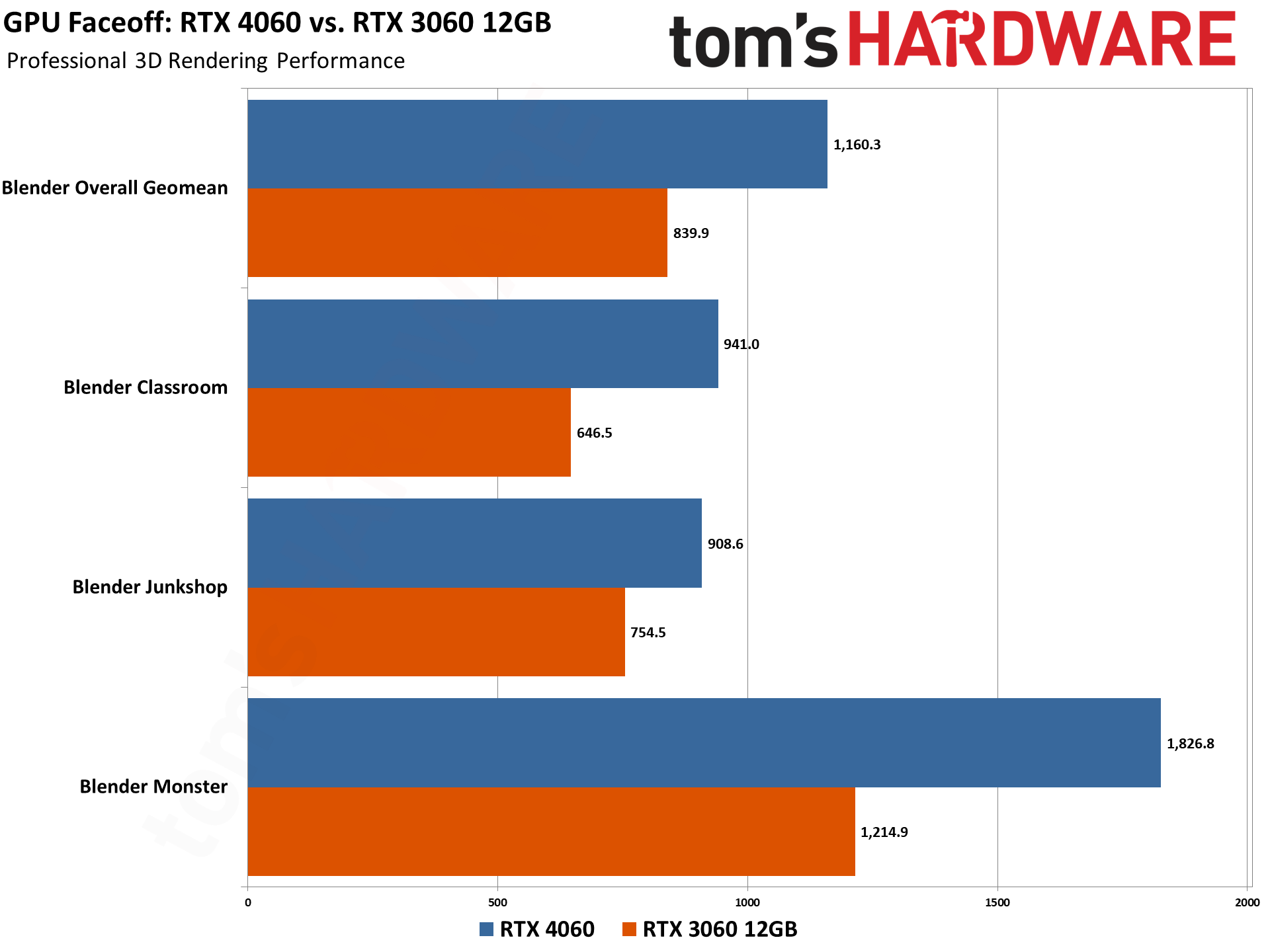
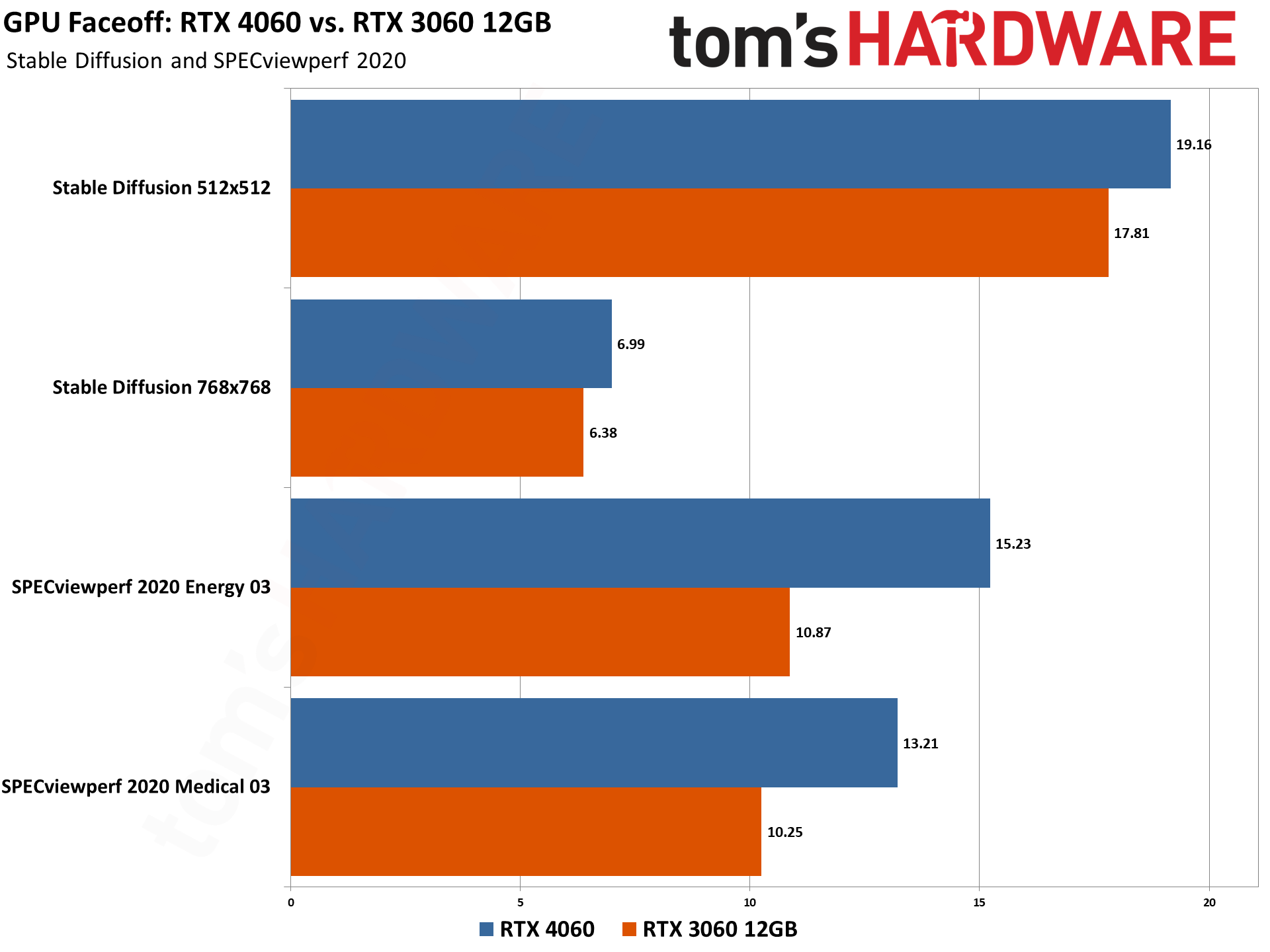
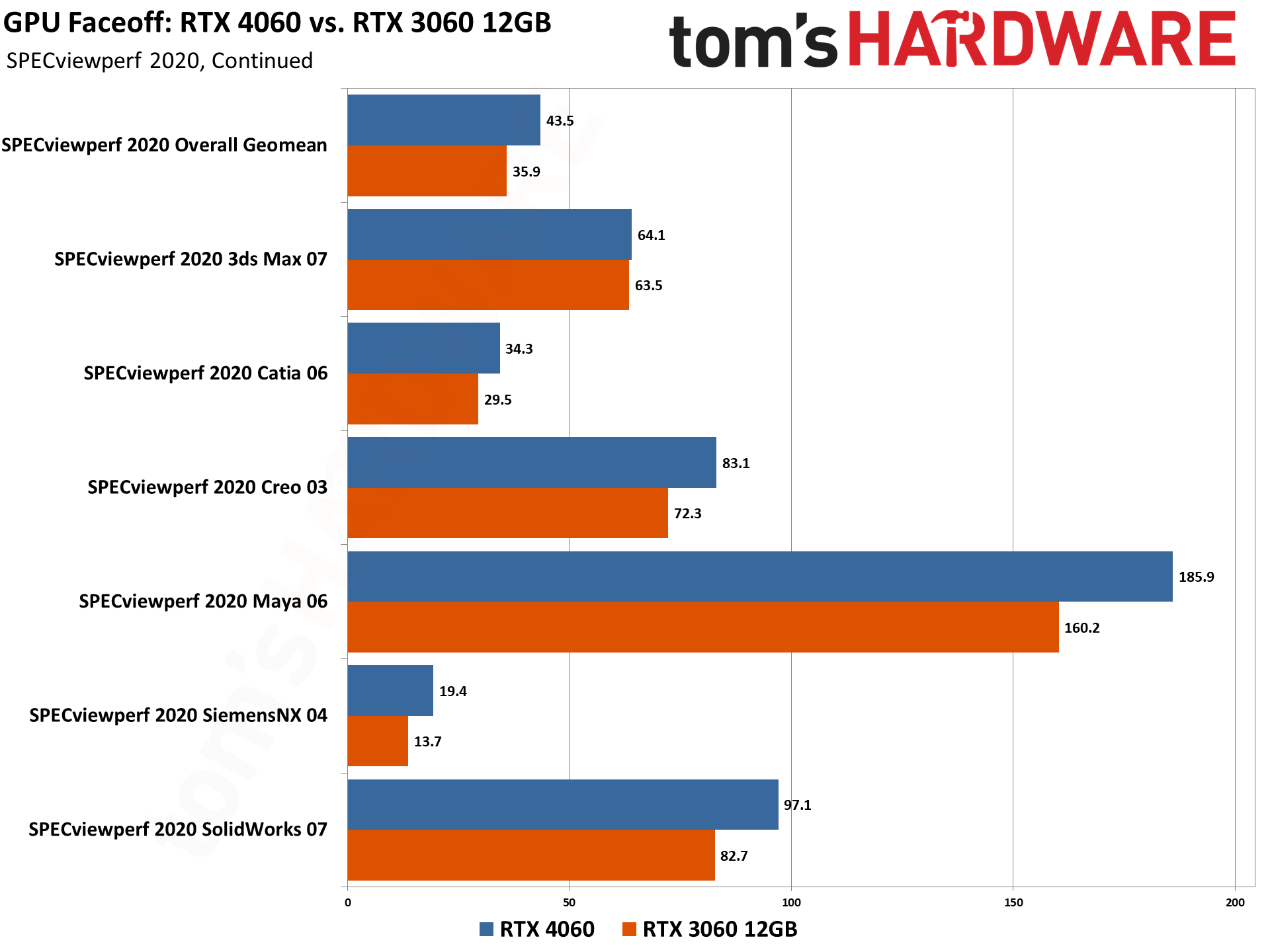
How do the two cards fare when running professional and AI workloads? The RTX 4060 sweeps the test results, leading by anywhere from around 10% to as much as 40%. There's a caveat here, however: AI workloads can often require more memory just to attempt running them. While we tested Stable Diffusion at 512x512 and 768x768, and the 4060 came out about 8~10 percent ahead of the 3060, there are LLMs that will need more than 8GB but could still work with 12GB.
We'd suggest upgrading to an even faster GPU than the 3060 12GB if you're actually looking into running AI workloads on consumer GPUs, and it's one of the few cases where the RTX 4060 Ti 16GB card makes sense. Otherwise, between the 4060 and 3060, the newer model will be the better pick.
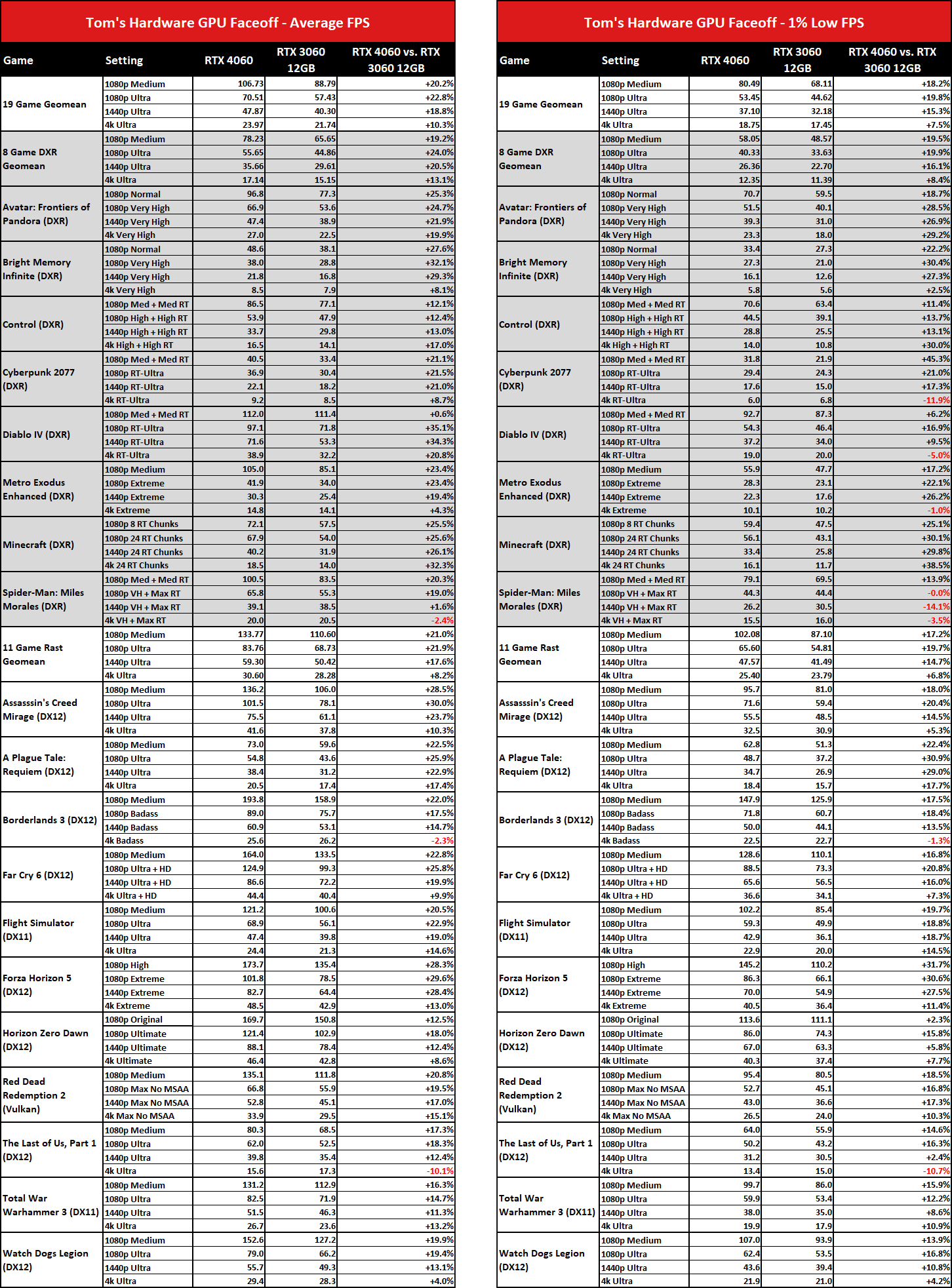
Overall Performance Winner: RTX 4060
For pure performance, newer hardware is almost always going to be better. Sure, older GPUs from a higher tier would be faster than a new lower-tier graphics card, but if you're looking at the same relative level — like 4060 and 3060, or 4070 and 3070 — it's no real contest. The 4060 typically deliver around 20% more performance than the 3060.
Of course, we've also noted that the RTX 4060 really feels more like a replacement for the RTX 3050, considering both offer 8GB of VRAM on a 128-bit interface. If we were doing that comparison, the upgrade would massive — the 4060 beats the 3050 by around 65% on average. But that's a story for another day.
RTX 4060 vs RTX 3060 12GB: Price and Value
- A new RTX 4060 generally sells for the same price as a new RTX 3060 12GB, so you should choose the newer card if you're cross-shopping
- RTX 3060 12GB cards might be cheaper on the used market, but a used graphics card could be a risk if it was used for applications like Ethereum mining
- The RTX 4060 consumes less power and is more efficient, so its total cost of ownership (TCO) is lower than the RTX 3060 12GB
Comparing prices between the RTX 4060 and RTX 3060 12GB is going to be a bit tricky. The cards launched in June 2023 and February 2021, respectively, so we're looking at a one year old GPU against a card that's more than three years old and has been effectively discontinued for quite a few months now.
If you're trying to find a brand-new RTX 3060 12GB, the cheapest one we can find is this MSI RTX 3060 12GB Ventus 2X for $288 on Amazon, with several other cards costing right around $300. The lowest cost 4060 card right now is this MSI RTX 4060 8GB Ventus 2X for $293 on Amazon. Quite a few other RTX 4060 cards can be found for around $300 as well. We're not going to argue over $5~$10 on a $300 graphics card, so this would sort of be a tie — with the understanding that by virtue of being faster, the RTX 4060 still represents a better overall value.
What about used cards, though? As a three years old card, there should be lots of used RTX 3060 GPUs floating about... and there are. Looking just at sold listing from the past month, the average price on eBay for the 3060 12GB was $221, with over 300 different sellers. The RTX 4060 on the other hand has an average sold price of $268 with only 71 sellers. We'd be a bit more hesitant about buying a used 3060, simply because it's old enough that it could have been used for Ethereum mining for over a year, but there are worse ideas.
If you're patient, you might also score a better deal and pick up a 3060 card for under $150 on auction. The lowest price on a 4060 meanwhile was $160, with most cards costing $200 or more.
Price and Value Winner: RTX 4060
We're not sold on the idea of buying a used card, so for new cards you're mostly looking at the same price. Then we have to give some weight to the higher performance and lower power use from the RTX 4060. It typically uses 30–40 watts less than the 3060, which can start to add up depending on how much you use your PC for gaming purposes.
At four hours per day, every day of the year, that's a difference of around 44–58 kWh — it would be more or less than that depending on how much you're using the GPU. That gives a baseline electricity cost difference of about $4.40~$5.80 per year if you pay 10 cents per kWh. However, that increases to potentially $17 at 30 cents per kWh, or $29 if you pay 50 cents per kWh. Saving even $40 on the initial price only to pay more over the long haul thanks to power use will definitely point plenty of people toward the 4060.
RTX 4060 vs RTX 3060 12GB: Power and Efficiency
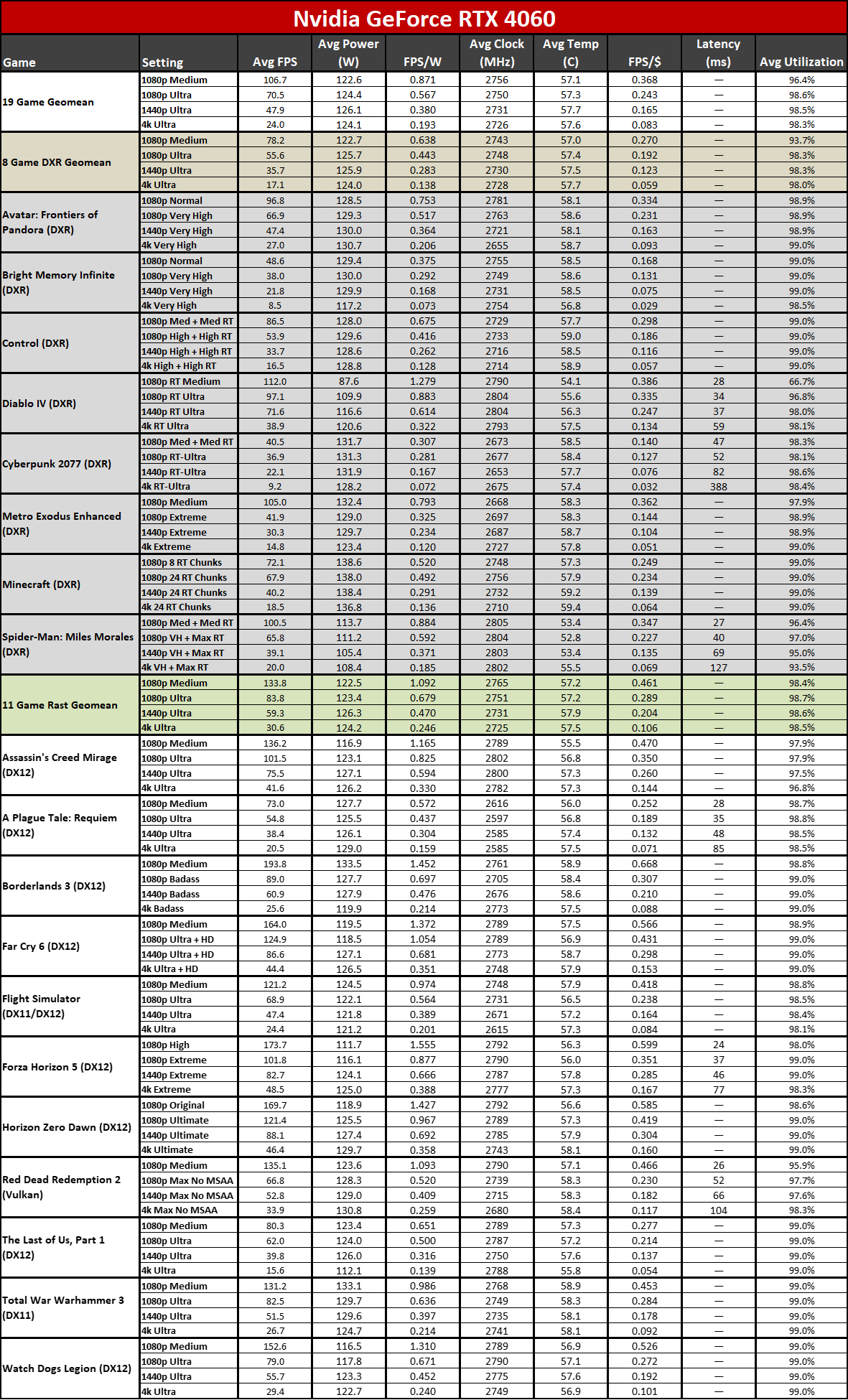
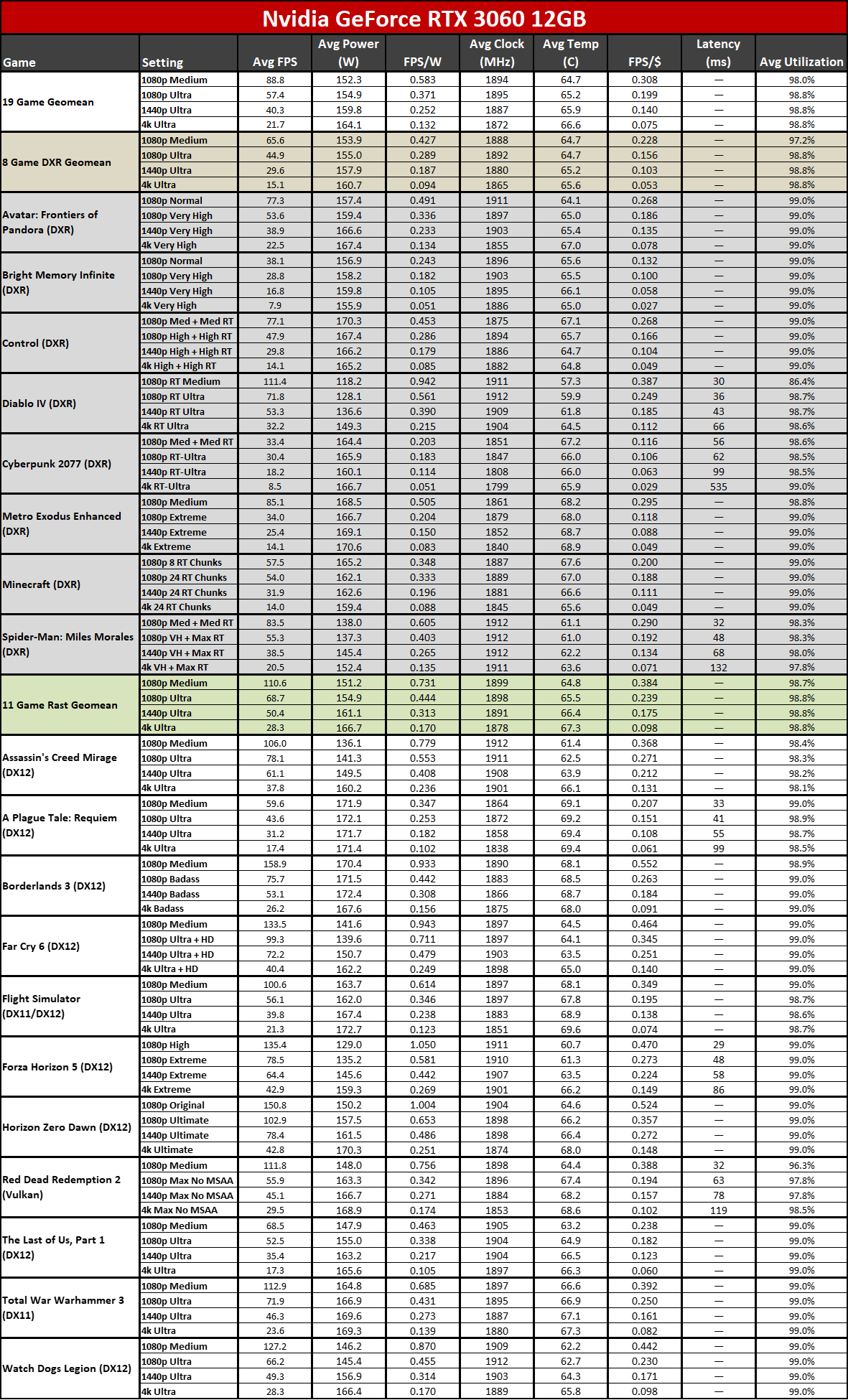
- The 115W TGP RTX 4060 is rated to draw less power than the 170W TGP RTX 3060 12GB
- In real-world gaming, the RTX 4060 draws about 34 W less on average than the RTX 3060 12GB
- The RTX 4060 delivers 50% better performance per watt than the RTX 3060 12GB, making it far more efficient
Power use clearly favors the RTX 4060. It's rated for 115W TGP (Total Graphics Power), while the older RTX 3060 12GB has a 170W TGP rating. On average, using our two sample cards — a factory overclocked Asus RTX 4060 Dual OC and a reference clocked EVGA RTX 3060 12GB Black — we measured a typical power delta of 30W at 1080p and 1440p, with a 40W advantage for the 4060 at 4K.
30W or even 40W might not seem like much, and if you're not playing a lot of games it's perhaps a less critical factor. But if you're gaming on a regular basis, particularly if you're playing games for 20 or more hours per week, all of that additional power use will add up.
It's not just about raw power use, either. We've already shown that the RTX 4060 generally offers 20% higher performance. Doing so while drawing less power means that the overall efficiency ends up being massively improved. The 4060 offers around 50% higher performance per watt than the RTX 3060 12GB.
Much of that delta is thanks to TSMC's 4N (5nm-class) process node, where Samsung's 8N (10nm-class) node was already behind the state of the art 7nm-class nodes when the RTX 30-series launched in 2020. But the cause is less important than the pure efficiency improvements, and for now, the RTX 40-series easily bests anything else that's available.
Power and Efficiency Winner: RTX 4060
There's no contest on efficiency. The RTX 4060 is around 50% higher performance per watt than the RTX 3060, and that's across all tested resolutions and settings. Raw performance is higher, raw power use is lower, and that's double the pleasure and double the fun for power efficiency.
RTX 4060 vs RTX 3060 12GB: Features and Technology
GPU | RTX 4060 | RTX 3060 |
|---|---|---|
Architecture | AD107 | GA106 |
Process Technology | TSMC 4N | Samsung 8N |
Transistors (Billion) | 18.9 | 12 |
Die size (mm^2) | 158.7 | 276 |
SMs / CUs / Xe-Cores | 24 | 28 |
GPU Cores (Shaders) | 3072 | 3584 |
Tensor / AI Cores | 96 | 112 |
Ray Tracing Cores | 24 | 28 |
Boost Clock (MHz) | 2460 | 1777 |
VRAM Speed (Gbps) | 17 | 15 |
VRAM (GB) | 8 | 12 |
VRAM Bus Width | 128 | 192 |
L2 / Infinity Cache | 24 | 3 |
Render Output Units | 48 | 48 |
Texture Mapping Units | 96 | 112 |
TFLOPS FP32 (Boost) | 15.1 | 12.7 |
TFLOPS FP16 (FP8) | 121 (242) | 51 (102) |
Bandwidth (GBps) | 272 | 360 |
TDP (watts) | 115 | 170 |
Launch Date | Jul 2023 | Feb 2021 |
Launch Price | $299 | $329 |
Online Price |
- The RTX 4060 has fewer, more advanced CUDA cores running at much higher clocks than the RTX 3060 12GB, delivering higher performance
- The RTX 4060's large L2 cache helps to overcome its raw memory bandwidth disadvantage versus the RTX 3060 12GB
- The RTX 4060 supports useful features like AV1 video encoding and DLSS Frame Generation that the RTX 3060 lacks
When it comes to specifications, the RTX 4060 and RTX 3060 have some interesting differences. The 3060 actually has more CUDA cores (GPU shaders), 3584 versus the 4060's 3072. However, clocks speeds are much, much higher on the 4060, so ultimately that's where the extra performance comes from, giving 15.1 teraflops of FP32 compared to 12.7 teraflops. Note that's a 19% advantage, which coincides almost perfectly with the performance differences shown above.
Memory bandwidth favors the 3060 on paper, but the large 24MB L2 cache on the 4060 more than makes up for that. What it can't do is overcome the deficit in VRAM capacity, but that mostly applies to 4K ultra gaming as a real concern. There will be other games where having 12GB results in a better experience, potentially even at 1080p, but in our view it's not a critical factor for a sub-$300 GPU.
In most other areas, the RTX 4060 is either equal to or better than the 3060. Obviously, the drivers and software are the same. Features like DLSS support are also basically the same, though the RTX 4060 also supports DLSS 3 frame generation — which ends up being a lot of marketing fluff for most use cases, particularly on this level of hardware.
There is one potentially noteworthy advantage to the RTX 4060, however. It supports AV1 video encoding. That's mostly going to matter if you're into streaming your gaming sessions, so again it's not a huge deal. The RTX 4060 also uses TSMC's superior N4 process node, with a 159mm^2 die size compared to the 3060's Samsung 8N node and 276mm^2 die size. The size itself doesn't really matter for end users, but TSMC 4N has clear efficiency advantages.
Features and Technology Winner: RTX 4060
The RTX 4060 doesn't offer too many major changes over the older 3060, but it does have AV1 encoding and DLSS 3 frame generation. It's also made on a newer process that boosts efficiency and performance. This isn't a landslide win, as mostly the two cards will offer similar features, but the 4060 does end up with a modest edge in features. It would be surprising if that weren't the case, given it uses a newer architecture.
Get Tom's Hardware's best news and in-depth reviews, straight to your inbox.
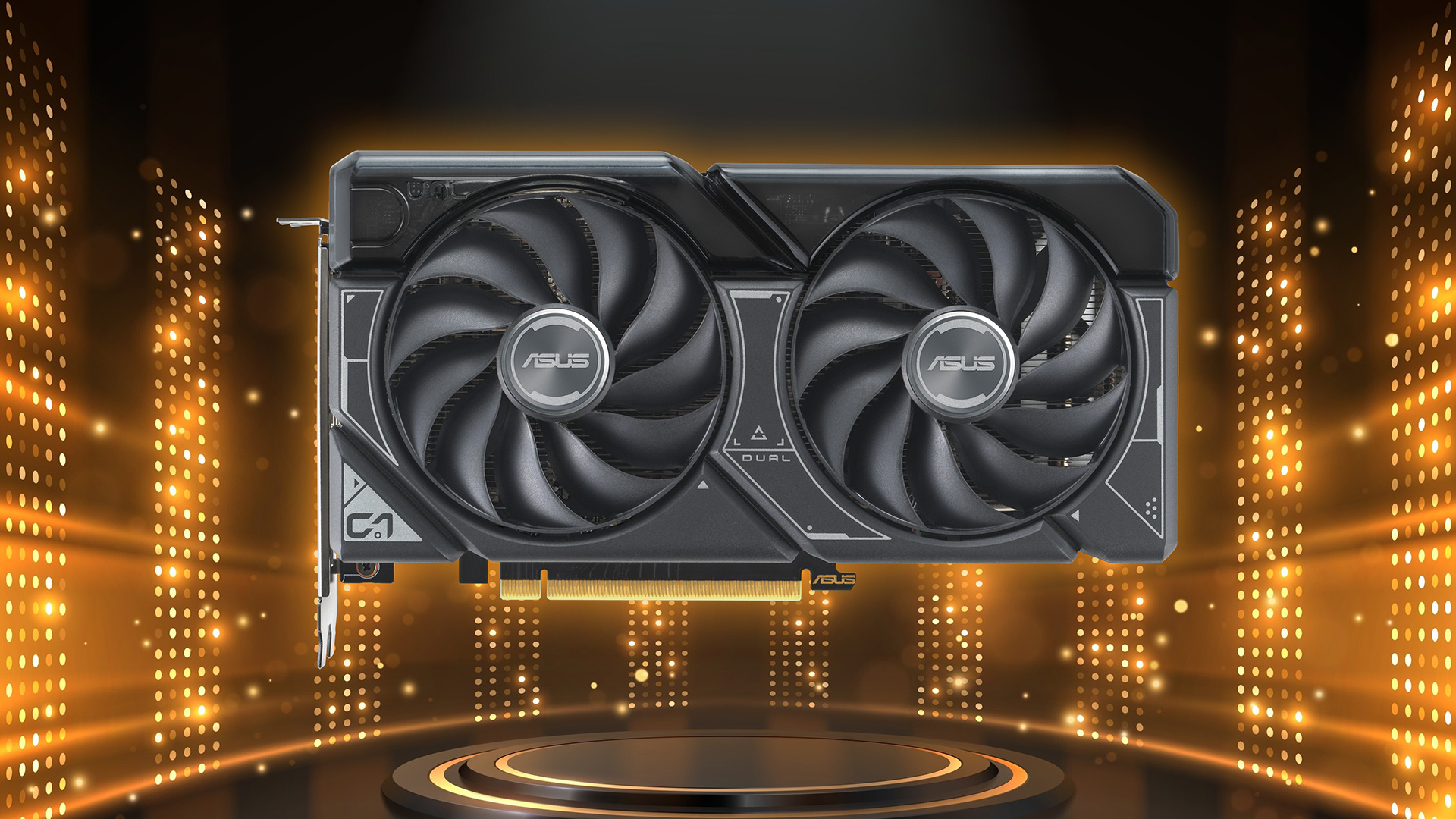
RTX 4060 vs. RTX 3060 12GB Verdict
| Row 0 - Cell 0 | RTX 4060 | RTX 3060 12GB |
Performance | X | Row 1 - Cell 2 |
Price and Value | X | Row 2 - Cell 2 |
Power and Efficiency | X | Row 3 - Cell 2 |
Features and Technology | X | Row 4 - Cell 2 |
Total | 4 | 0 |
- The RTX 4060 is a superior graphics card to the RTX 3060 12GB in performance, price and value, power usage and efficiency, and technological features
- If you already have an RTX 3060 12GB, the advantages of the RTX 4060 likely aren't worth a direct upgrade
- If you have an older PC, you may need to upgrade more components than your graphics card to get the best gaming performance
The RTX 4060 easily wins this faceoff. That's sort of a no-brainer and we almost felt it wasn't even worth discussing, but there's enough talk that it's good to set the record straight. If anyone tries to tell you that the RTX 3060 12GB is a superior card to the RTX 4060, they're selling you on a story with no basis in reality.
For its time, the RTX 3060 12GB was arguably a better balanced card, but three years later, even if the RTX 4060 isn't a massive improvement in overall performance and does take a step back in VRAM capacity, it's still faster and better. All the architectural upgrades make it the superior card, sweeping all four of our faceoff categories.
That doesn't mean you should run off and sell your RTX 3060 12GB if you have one, of course. We generally want at least a 50% boost in performance to entice us to upgrade, and preferably double the performance. If you have a 3060 12GB and you're not happy with how it runs games right now, you'd be much better off upgrading to an RTX 4070 or RTX 4070 Super — or waiting for what will hopefully be a better card with the future RTX 5060. The 4070 would give a very noticeable improvement in performance, though it would cost significantly more money to get there, naturally.
We should also note that if you're currently on a PC that's five years old or more, you may need more than just a new graphics card to get a good overall increase in gaming performance. Upgrading your CPU, motherboard, and memory represents a significant investment, so it might be easier to sell off your old PC entirely rather than just trying to upgrade the GPU, but that's yet again a topic for another day.
The RTX 4060 isn't an amazing graphics card. We really wish Nvidia had given it 12GB or even 10GB of memory at least. But with a $300 starting price (we've seen it go for as little as $279), it's less expensive and faster than its direct predecessor. Hopefully, the upcoming Blackwell RTX 50-series GPUs will deliver additional improvements that will put the 8GB VRAM story to bed.
Until then, if you need a graphics card right now and you don't want to spend more than $300, the RTX 4060 remains the best current option. For previous generation GPUs, it's slightly slower than an RTX 3060 Ti or RX 6750 XT — with the latter being a viable alternative, particularly if you don't care about ray tracing and DLSS.

Jarred Walton is a senior editor at Tom's Hardware focusing on everything GPU. He has been working as a tech journalist since 2004, writing for AnandTech, Maximum PC, and PC Gamer. From the first S3 Virge '3D decelerators' to today's GPUs, Jarred keeps up with all the latest graphics trends and is the one to ask about game performance.
-
jordanbuilds1 imo, the 3060 is better value, especially on the used market. at the 4060s current $300 price, there are alot of better and cheaper alternatives online such as: rtx 3070, rx 6600, rx 6650, rtx 2080 super, intel arc a750, and the list goes on. the 4060 is trashed on for a reason, but that doesnt mean it doesnt have its place in "someones" pc.Reply -
JarredWaltonGPU Reply
This is precisely the sort of mindset that I was hoping to disprove. A used 3060 12GB will cost, on average, about $220. A used 4060 can be had for $260. That's a $40 difference, and anywhere from $5 to $15 per year (estimating use) in power use for the 3060, while getting 17% less performance. All for what? 12GB VRAM, basically, which theoretically helps at 4K ultra in some newer games, and even fewer games at 1440p ultra.jordanbuilds1 said:imo, the 3060 is better value, especially on the used market. at the 4060s current $300 price, there are alot of better and cheaper alternatives online such as: rtx 3070, rx 6600, rx 6650, rtx 2080 super, intel arc a750, and the list goes on. the 4060 is trashed on for a reason, but that doesnt mean it doesnt have its place in "someones" pc.
RX 6600 and RX 6650 are cheaper, as new cards, but also much slower than a 4060 across a broad test suite. The 4060 beats the RX 6650 by around 40% across our test suite, and it's around 60% faster than the vanilla 6600. And it uses less power than either card as a bonus, plus gives access to Nvidia tech like DLSS.
RTX 2080 Super costs about the same, used, as the RTX 3060 12GB. It's a "win some, lose some" competition with the 4060, basically a tie... while using twice as much power and with the same 8GB VRAM. And you're getting a card that came out five years ago, which was 99% certain (probably) used for mining and could have some issues because of that. I definitely wouldn't buy or recommend anyone buy a used 2080 Super at $225 over an RTX 4060. Okay, maybe if it's $100, but I'd be very skeptical of stability and quality if that's from an eBay or Facebook seller (considering the going rate is over twice that).
But this isn't about all the alternatives to an RTX 4060, or whether you should upgrade from one of the above mentioned cards to a 4060. It's about how the 4060 and 3060 comparison is often portrayed as being a big step back for the new card. You have to really cherry pick your tests to make that even close to being true. Mostly, it's just screaming "8GB is terrible!" and then ignoring all the use cases where 8GB is still totally fine.
Out of 76 different tests, across 19 games and four settings, the 3060 12GB was faster in just three cases (4% of the time), and only in one case (1.3% of cases) was the difference more than 10% — all at 4K, naturally. And even then, it was a case of 17.3 vs 15.6 fps. Not exactly a ringing endorsement for either GPU at such settings. Even looking at the 1% lows, where there were five instances that the 3060 offered higher minimum fps, and three cases where it was more than a 10% lead, the 3060 only hit a playable result in one of those games (Spider-Man: Miles Morales, which I called out).
So edge cases that happen maybe 1% of the time could give the 3060 a performance lead. At 1080p, where such cards are likely to be used, I haven't run or encountered a single "realistic" test that where the 3060 was ahead or even close to being tied. And by "realistic" I mean a game where people would actually use the specified settings on the 3060 12GB to get a playable result. -
ReplySyCoREAPER said:Not worth it at all IMO unless your dying for frame generation.
Agreed. Especially, considering the fact we 're just months away from the release of the RTX-50 series. -
JarredWaltonGPU Reply
Budget "RTX 5060" cards likely won't be out for about a year, though. The people in the market for a 4060 aren't even thinking about buying a 5090 or 5080 this fall I suspect.valthuer said:Agreed. Especially, considering the fact we 're just months away from the release of the RTX-50 series. -
Notton Going off of Nvidia's historical release sequence, If RTX 5080 launches in 2024 September/October, the RTX 5060 won't arrive until 2025 July/August.Reply
If it launches before March/April, it's most likely going to be an 8GB card.
Having tried out frame-gen and up-scaling on an RTX 2050 and RTX 4070Ti, it's definitely worth running it.
The early implementation wasn't good, but the technology feels mature, now that it works with ray-tracing.
It's a buttery smooth 120fps using 1440p all max/ultra graphics with ray-tracing enabled... 99% of the time. -
AtrociKitty There's one test I would have liked to see that isn't here, and that's transcode performance. I'm fairly sure that's the one place the 3060's VRAM advantage actually does make the card come out ahead.Reply -
ReplyJarredWaltonGPU said:Budget "RTX 5060" cards likely won't be out for about a year, though.
If that comes to pass, it will be too bad. There's a lot of people out there, waiting for the mid-range RTX-50 GPUs, as well as the subsequent price decrease in RTX-40 series. -
hotaru251 So it doesnt say in article (at least i didnt see any) but was it pure rasterized or using the "gimmick" of dlss and the like? (yes that gimmick is likely future goign forward given how game devs dont optimize anymore but if you enjoy older games thats not an option)Reply
As main issue of 4060 was not the lower vram (that sucked but not main issue) it was the memory bus reduction which can have real impact ( why the 3060 at times could beat 4060 in stuff that didn't have those gimmicks available) when it became the limiting factor. -
SyCoREAPER 40-series demand was decent but I don't think a massive success either. It was mostly artifical shortages. Considering the 50-series will probably cost even more (and still use the dumbass 12VHPWR connector), I don't think people will be flocking to them.Reply